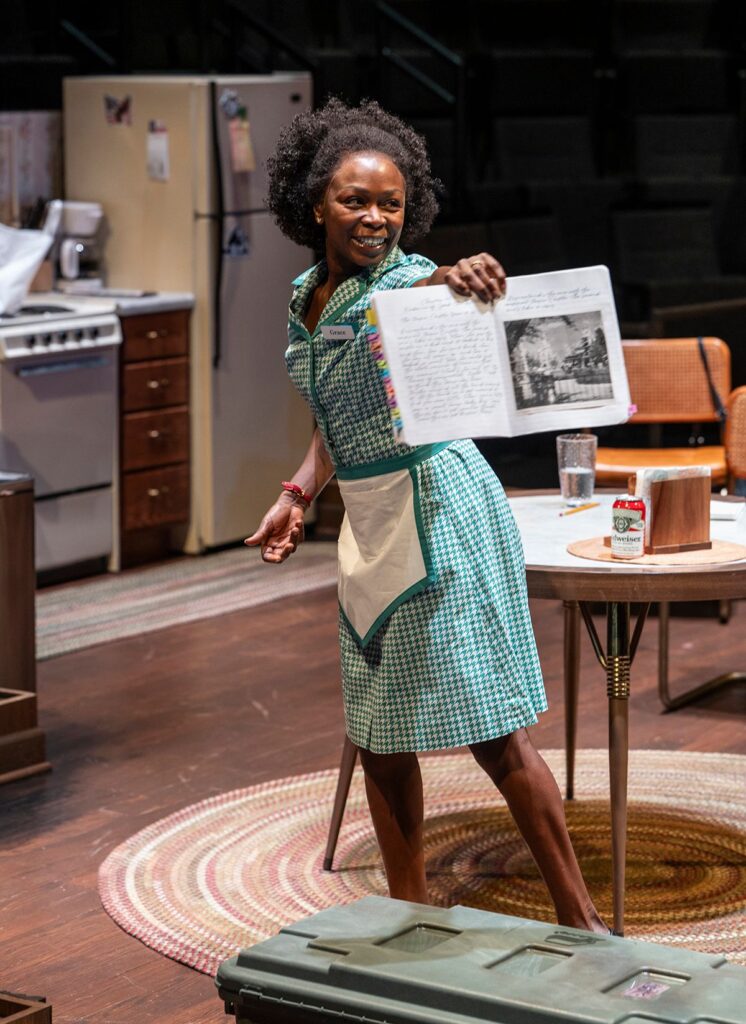
I am not a theater critic but I have been devoted to covering theater since my early 1980s reports on the explosion of Chicago storefront theaters for National Public Radio. On The Mara Tapp Show in the 1990s, I was honored to host weekly conversations about and offer scenes from some of Chicago’s best shows, and delighted when those interviews filled houses for our local theaters.
In 2015, at the request of friends, I started a series of emails with recommendations for shows I thought worthy of patrons. Some years later, actors, directors and publicity people in Chicago’s theater world prevailed on me to share these raves, a request I accepted, especially in light of the increasing tensions in the theater world and need to keep Chicago theaters healthy. Read more…
Find out what the critics think at the Review Round-up on the website of TheatreInChicago.com.
Breaking News

I’ve stepped into the 21st Century and you can find me on Instagram at https://www.instagram.com/tappraves/. Please follow me to shine a spotlight on the excellent performing arts organizations and artists I am honored to cover.
Musical Magic Previews
International Contemporray Ensemble
April 26 and 27

Chicago is now a hub for contemporary classical music so we will get two performances by the International Contemporary Ensemble better known as ICE. No not that one. This ICE is a group of 34 musicians who have been challenging and delighting audiences for nearly 25 years.
They’ll be back in Chicago this weekend for the Northwestern University New Music Conference, an exciting event in and of itself. In the decades my late husband and I enjoyed ICE performances, we were always impressed by the cutting-edge interpretations of new music, and the skills and sensitivities of the extraordinary musicians who performed them.
Get the details at ICE at Northwestern University New Music Conference — International Contemporary Ensemble so you don’t miss the chance to see not one but two ICE concerts this weekend, Saturday, April 26 and Sunday, April 27th.
Calco Presents Nova Zaii
April 26 at 8 PM

The next Calco concert could transport you to celestial heights. Check out the musical genius of Chicago Artist Nova Zaii, who employs his technical smarts to summon up music simply by touch.
Calco concerts are now a must for me because the quality of the performers, the diverse-by-every-measure crowd, the spectacular space with its view of the Chicago River and the joyous-but-chill vibe.
Last month we danced ourselves silly to the sounds of the Chicago-based Brazilian trio Bossa Três. I raved about Anaiet Soul’s February performance to anyone who would listen. Enjoy one of her songs from that show at https://drive.google.com/file/d/1BMZyFIv1S-EVwsCc6nitUBkcVRJmgHZK/view?usp=drivesdk.
Calco Curator Giovanna Boffa, the daughter of friends, continues to delight everyone I bring to the Calco shows at Rockwell on the River with her musical choices. Make sure you catch Drummer Nova Zaii’s performance show this Thursday!
Raves
The Book of Grace

Photo by Michael Brosilow.

Steppenwolf Theatre Company through May 18
Highly Recommended
When a beautiful petite waitress in a blue-checked diner uniform walks onstage and starts to talk, her quirkiness, warmth and humor are irresistible. Then you meet her husband. He is fulminating about aliens – no, not that kind – as he irons his border patrol uniform, making sure each crease is perfect.
To say Grace and Vet are a mismatched couple would be beyond diplomatic. She is filled with irrepressible hope; he is overflowing with fizzing rage. After some reassuring and flirtatious marital conversation, Grace heads off to the diner and Vet continues to prepare for his work when a handsome young man appears and knocks on their front door. It turns out he is Vet’s son.
There will be no embrace despite a 15-year estrangement. Rather, in true border-patrol style, Vet pats him down and takes all the necessary precautions one would intercepting someone crossing the border illegally rather than one’s long-lost son. Buddy, this son, doesn’t seem to mind. In fact, he acquiesces, displaying his own military training.
What unfolds in the next two-and-a-half hours touches on the saddest of age-old family conflicts, of lies and deceits and heartbreak. Yet the complications and potential happiness of this blended Black family are handled with such sensitivity, skill, intensity and humor that the time flies by, and the audience is drawn into this story completely.
Every one of the three actors is sublime. The range of emotions – from forgiving love to incredible sadness to empathy to rejection to hope – that they are able to convey is evidence of their skills.
Zainab Jah glows as Grace, her open, sunny face a beacon for hope of the very sort with which she fills the pages of “The Book of Grace” that she is secretly writing. Her wiry frame bursts with joy at good memories and the happy news stories she’s collecting. Yet Jah easily shifts to a soft persuasive spouse or stepmother intent on reconciling the men in her life, this father and his son from a previous marriage.
Brian Marable, as her husband Vet, brings the right kind of rage to his role, one that makes him attractive and likeable in the first half despite his ranting, but is revealed as something entirely different as the play progresses. Marable came late to his show, replacing the actor originally cast just over two weeks before opening, which makes his performance even more impressive.
Namir Smallwood, hot off his success in Primary Trust at Goodman Theatre, is ideal here as the damaged son. His face, with its quicksilver emotional shifts, and always-on-alert body showcase Smallwood’s focus and talent in completely inhabiting his characters, which made him so charming at Goodman. Smallwood’s hallmark intensity is perfect for The Book of Grace. His tight portrayal of a wounded man, here to celebrate an award his father is receiving, and increasingly grateful to Grace for her support, optimism and, well, grace, is ideal – and full of surprises.
This top-notch trio lifts Playwright Suzan-Lori Parks’ The Book of Grace to a different level under the sure-handed direction of Steve H. Broadnax III. Arnel Sancianco’s small-town with its neat kitchen, unpretentious living room and backyard offers a believable setting to highlight the action.
The Book of Grace is a deeply layered play that comes at family relationships with a complexity expressed through its profoundly intelligent and driven characters. It is an excellent embodiment of the domestic intensity for which Steppenwolf is revered. This provocative and beautiful piece will pull you in, expand your understanding of difficult issues and hope in ways that may surprise you and alter your perspective. Isn’t that what theater should do?
